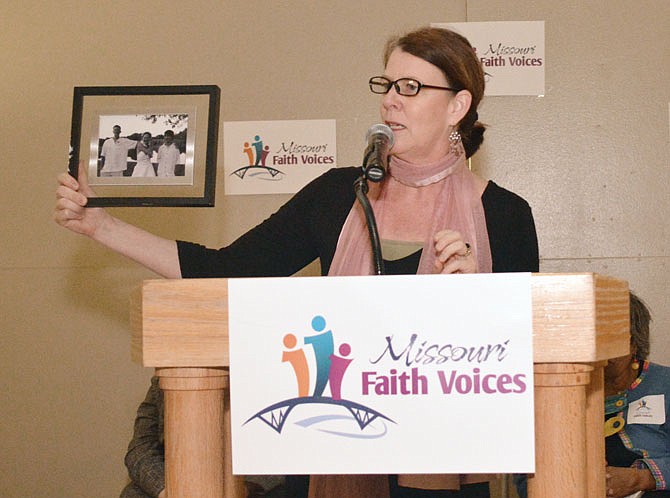Missouri Faith Voices declared its "moral agenda" to legislators in the Capitol Rotunda early Tuesday afternoon.
The organization, which works to end poverty, financial predation and health disparities, called on Missourians to meet with their legislators to discuss three issues of concern.
The Rev. Cassandra Gould, director of Missouri Faith Voices and pastor of Quinn Chapel A.M.E. Church in Jefferson City, said the issues are particularly important to supporters of Faith Voices' moral agenda. Two bills - House Bill 1255, which would prevent people younger than 18 from being prosecuted as adults for most criminal offenses, and HB 1541, which would cap interest rates on payday loans at 36 percent - are legislation the moral agenda supports.
Also, Gould said, an immoral budget and tax policies don't provide adequate state support for health care, education, Medicaid, adequate pay, transportation and other issues affecting poor people.
"As people of faith, we believe that we're in an era in which politicians control narratives - even for the church," Gould said.
Speakers at the rally included Tracy McClard, who founded Families and Friends Organized to Reform Juvenile Justice after her youngest son killed himself in prison at age 17. He was convicted of a felony at 16.
But McClard didn't want to talk about her youngest son. She instead spoke about her middle son. That son, sentenced at age 17 to 10 days in a county jail after a fight, was placed in a pod with 10 men. The first night, they broke four of his ribs. Because he wouldn't tell jailers who had beaten him, jailers held him for an extra day, McClard said. He was abused for the next eight days, didn't eat the entire time, and lost 25 pounds in 11 days, she said.
She said Missouri is one of five states that automatically charge people younger than 18 as adults. In Missouri, the age for criminal responsibility is 17.
"If we don't raise the age, this will happen over and over and over and over," McClard said.
She said two things happen when teenagers are placed in jails and prisons with adults: they are sexually or physically assaulted within the first 48 hours, or they are put in cells alone.
"Both ways, their mental health suffers and they come home with lingering problems," she said.
A payday loan borrower, Patricia Reynolds told listeners about the spiraling hole of debt that develops when someone borrows at interest rates that sometimes can be as high as 1,900 percent.
Reynolds borrowed money to pay a bill, not realizing each time she made a payment, she was falling deeper in debt. By the time a church stepped in to pay her bill and began accepting payments from Reynolds, she owed $1,300 on a $300 loan.
"You don't know that most of the money goes to interest," Reynolds said. "Nobody tells you about the interest rates."
Jeanette Mott Oxford, executive director of Empower Missouri, said all Missourians deserve access to basic human needs - including health care and child care.
"We think our state is not doing a very good job in that regard," Oxford said.
It's not doing a very good job in many ways, she said. As needs for services and education increase, the state cuts revenue for those needs, Oxford said. In trying to make the state "business-friendly," it has slashed taxes on corporations, she added.
"Corporations should also bear responsibility for supporting the common good," Oxford said. "Corporations use ports, roads, bridges. They use an educated workforce. They rely on police and fire protection. They use courts for mergers, acquisitions and bankruptcies."
Everyone should put in the amount they're able to support the common good, she said.
Voters must insist, Gould added, lawmakers not make the kinds of policies that allow teenagers to be imprisoned, for payday predation and that they must pass a moral budget.
"I believe that the budget is a moral document," she said. "And the current one is immoral."

